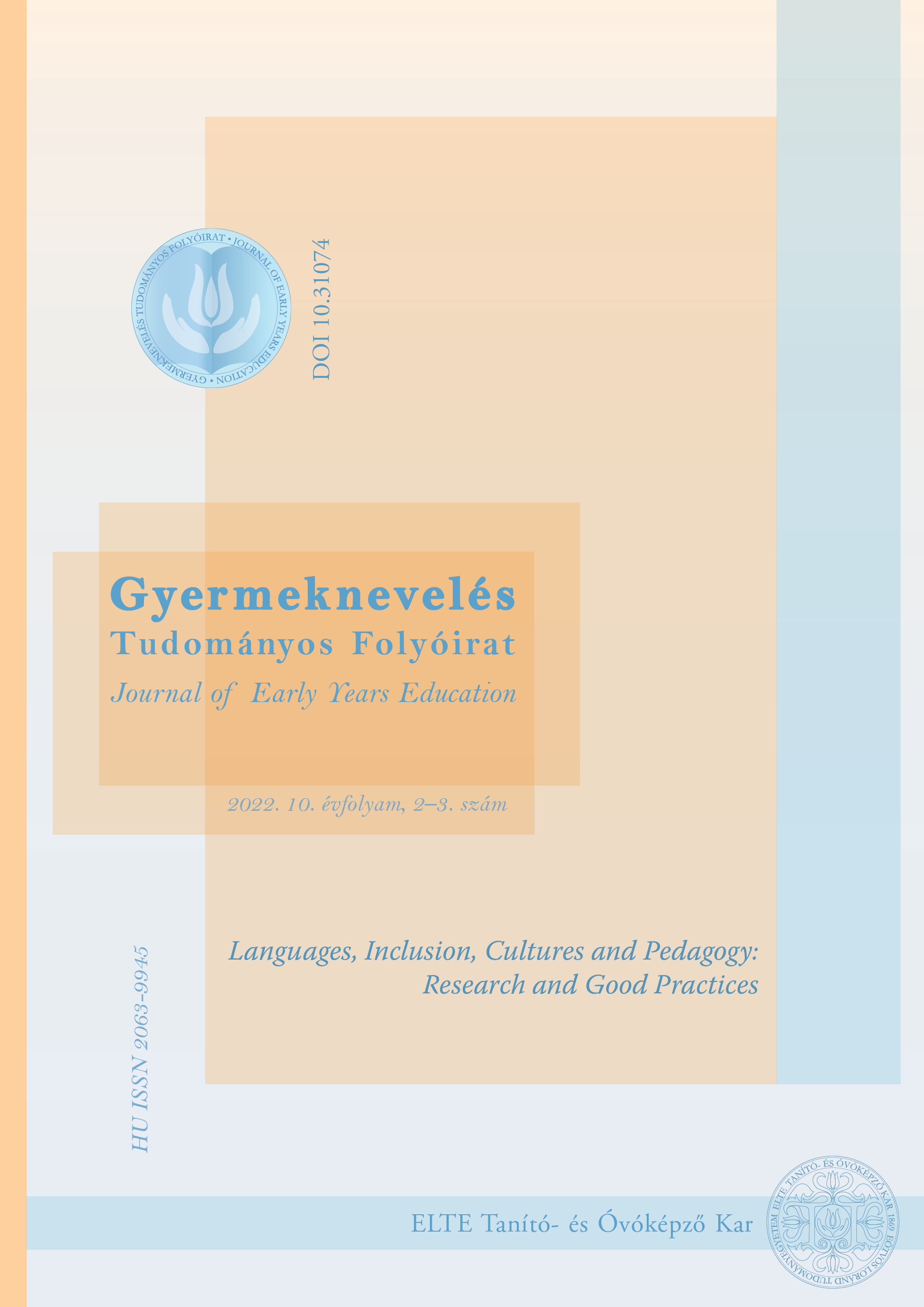Celebrating languages and cultures:
Nurturing the non-formal language learning environment in teacher education
DOI:
https://doi.org/10.31074/gyntf.2022.2.27.46Kulcsszavak:
language learning, higher education, motivation, learner autonomy, non- formal learningAbsztrakt
This article gives an account of the development of an event designed to motivate teacher trainee students to learn languages. The event was planned and organised by the Department of Foreign Languages and Literature at the Faculty of Primary and Pre-school Education, Eötvös Loránd University (ELTE TÓK). The department’s intention was to play a proactive role in enhancing students’ language education by crossing the boundaries of formal foreign language courses. The initial concept was to hold a language fair like a pop-up event that would be easily noticeable throughout the building, flexible for participants and cater to the students’ individual needs. Entitled ‘Drop everything and learn/teach languages’, this event was held on September 26th, the European Day of Languages, as introduced by the Committee of Ministers of the Council of Europe in 2001, the Year of European Languages (Council of Europe, 2001). The European Day of Languages aims to draw attention to the importance of language learning, promote the rich linguistic and cultural diversity of Europe, and encourage lifelong language learning in and out of school. The title of ‘Drop everything and learn/teach languages’ was additionally inspired by the ‘Drop Everything and Read’ programme initiated to promote sustained silent reading.
Letöltések
Hivatkozások
Council of Europe (2001). Statutory Report 2001. Council of Europe. https://rm.coe.int/16804a0b4b
Council of Europe (2019). Education and Training Monitor. Council of Europe.
Council of Europe (2020). Common European Framework of Reference for Languages: Learning, Teaching, Assessment. Companion Volume. Council of Europe. https://rm.coe.int/common-european-framework-of-reference-for-languages-learning-teaching/16809ea0d4
Cotterall, S. (1995). Developing a course strategy for learner autonomy. ELT Journal, 49(3), 219-227. https://doi.org/10.1093/elt/49.3.219
Csizér, K. (2007). A nyelvtanulási motiváció vizsgálata: az angolul és németül tanuló diákok motivációs beállítódása a nyelvválasztás tükrében. Új Pedagógiai Szemle, 57(6), 54–68.
Csizér, K. & Kormos, J. (2007). Az angol nyelvtanulási motiváció alakulása Budapesten tanuló egyetemisták és főiskolások körében. Magyar Pedagógia, 107(1), 29–43.
Csizér, K. & Kormos, J. (2008). Age-Related Differences in the Motivation of Learning English as a Foreign Language: Attitudes, Selves, and Motivated Learning Behavior. Language Learning, 58(2), 327-355. https://doi.org/10.1111/j.1467-9922.2008.00443.x
Dörnyei, Z. (2005). The Psychology of the Language Learner: Individual Differences in Second Language Acquisition. Lawrence Erlbaum. https://doi.org/10.1075/aila.19.05dor
Dörnyei, Z. & Csizér, K. (1998). Ten commandments for motivating language learners: results of an empirical study. Language Teaching Research, 2(3), 203-229. https://doi.org/10.1177/136216889800200303
ELTE TÓK (2022). Language Examination Data. Unpublished confidential document.
Eurostat (2016). Foreign Language Skills Statistics. https://ec.europa.eu/eurostat/statisticsexplained/index.php?title=Foreign_language_skills_statistics
Eurostat (2019). Foreign Language Learning Statistics. https://ec.europa.eu/eurostat/
statistics-explained/index.php?title=Foreign_language_learning_statistics&
oldid=542152
Flash European Barometer (2018). The European Education Area. A Report. European Commission. https://doi.org/10.2766/313250
Hámori, Á. & Ujj, D. (2017). A felsőoktatásba jelentkezők nyelvtudása képzési terület és életkor szerinti összevetésben. Felsőoktatási elemzési jelentések, 1(4) https://www.felvi.hu/pub_bin/dload/felsooktatasimuhely/Elemzesi_Jelentesek/FEJ_2017_4.pdf
Harmer, J. (2007). The Practice of English Language Teaching. Pearson Education.
Hedge, T. (2000). Teaching and Learning in the Language Classroom. Oxford University Press.
Nikolov, M. (1999). “Why do you learn English?” “Because the teacher is short.” A study of Hungarian children’s foreign language learning motivation. Language Teaching Research, 3(1), 33–56. https://doi.org/10.1177/136216889900300103
Nikolov, M. (2011). Az idegen nyelvek tanulása és a nyelvtudás. Magyar Tudomány, 172(9), 1048–1057.
Novák, I. & Morvai, L. (2019). Foreign language learning attitude of Hungarian higher education students. Hungarian Educational Research Journal, 9(2), 303–317. https://doi.org/10.1556/063.9.2019.1.26
Oxford, R. (2001). Language Learning Strategies. In Carter, R. & Nunan, D. (Eds.), Teaching English to Speakers of Other Languages (pp. 166–172). Cambridge University Press. https://doi.org/10.1017/CBO9780511667206.025
Öztürkl, G. (2019). Fostering Learner Autonomy among Pre-Service EFL Teachers: A Mixed-Method Study. International Journal of Educational Psychology, 8(3), 298–316. https://hipatiapress.com/hpjournals/index.php/ijep/article/view/4427. https://doi.org/10.17583/ijep.2019.4427
##submission.additionalFiles##
Megjelent
Hogyan kell idézni
Folyóiratszám
Rovat
License
Copyright (c) 2022 Szerző

This work is licensed under a Creative Commons Attribution-NonCommercial-ShareAlike 4.0 International License.

